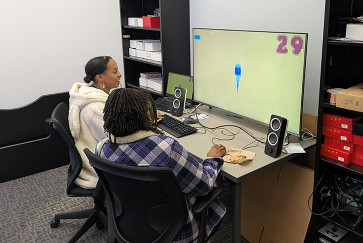With classroom dynamics upturned, monitoring a student’s work in person may feel like a thing of the past. But tools from Northwestern University professor Michael Peshkin make it easier for instructors to create low-cost solutions to engage with students remotely.
“Last spring, everybody was trying to teach online any way they could,” Peshkin said. “Now we’re trying to get a little more professional about it.”

Using a 25-cent plastic mirror or even a makeup compact, Peshkin helps his students show their work in real-time. His students use the homemade tool to show their calculations or design sketches and to get feedback from instructors on technical projects.
With the small plastic mirror and about a foot of 22-gauge bell wire, students can transmit handwritten work live while using screenshare on Zoom. Professors then can use Zoom’s annotation tools to draw on the student’s sheet of paper on the screen via the camera viewer app.
“I was trying to figure out how to make a document camera, and the answer is a mirror,” Peshkin said. “That mirror just redirects your webcam and allows students to show their work.”

Peshkin is a mechanical engineering professor in the McCormick School of Engineering, and the Breed Senior Professor of Design. As a leading expert in robotics, he’s also developing tools to aid professors. Rapid digital transformation in education presented an opportunity for Peshkin to innovate, and his tools have become increasingly relevant with the pandemic. Peshkin was appointed the mechanical engineering department’s curriculum innovation lead in the spring when remote learning suddenly became essential.
Most recently, Peshkin created a cheap hack for students to transform a laptop webcam into a document camera. He also helped develop nScope, a portable USB-powered device that fits in a backpack and turns any laptop into an electronics workbench. The “lab in a backpack” includes an oscilloscope, function generator and power supply on a small card. Users can build, measure and test electronics, then download data to their computers. The devices are currently used in classrooms at Cornell, Duke, Harvard and the University of Notre Dame, among others.

Even during in-class learning, Peshkin found the nScope useful for creating engaging environments for students. Instead of hurrying to finish a project in a lab, students could bring projects home to continue tinkering. Tools like these have made transitions to remote learning much smoother.
“We made this portable lab that would be a great thing for people to be picking up right now,” Peshkin said.
Classes taught in person and on Zoom present content live, as well as short pre-recorded content to review at home. Peshkin’s glass chalkboard — The Lightboard — helps faculty record short videos while their writing glows in front of them. The component is open source, allowing dozens of universities to create their own versions of the tool.

“It's just that much more watchable if I'm looking at you with the writing in front of me,” Peshkin said. “It's much more attractive and engaging for students, rather than having me look back over my shoulder as I write on the blackboard.”
Though each teaching tool was built on a different timeline with different audiences in mind, Peshkin said he dusted off 60 Lightboard videos he’d made in 2013, and used them in addition to his live lectures, in the spring when the pandemic hit. Two tools—the Lightboard and portable lab—that weren’t created with a pandemic in mind have become critical components to lab class. And new inventions like his laptop doc cam are making innovation more targeted and accessible.
Lab classes and remote learning may seem like a particularly poor fit, but when paired with Peshkin’s teaching style, it becomes not just possible, but exciting and satisfying. As fall quarter came to a close, Peshkin received a flood of emails from happy students, thanking him for easing their transition to online school.
“I think it took on a special meaning for them because so many of the physical or hands-on parts of their education were lacking,” Peshkin said.

